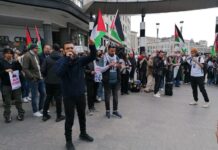
Hundreds of Palestinians marched against the so-called “Electronic Crimes Law” on Tuesday, 10 October before being blocked by Palestinian Authority security services from reaching the PA Prime Minister’s office in Ramallah.
The march began from the Palestinian Legislative Council office in Ramallah but was blocked by PA security forces’ barricades along its path; it was organized by civil society groups protesting the new law, created by a decree by PA president Mahmoud Abbas.
Numerous Palestinian activists and organizers have been arrested under the law, which attempts to criminalize social media posts and other online publications critical of PA officials. Palestinian civil society organizations have demanded its immediate cancellation, noting that it is an attack on public freedoms and deepens Palestinian division at a time that Palestinian expression is under massive attack by the Israeli occupation.
The “Electronic Crimes Law” has been widely condemned by political parties and organizations throughout occupied Palestine. The PA law, which attempts to criminalize Palestinian political expression on Facebook and in the media, comes alongside systematic Israeli attacks on Palestinian expression, including the persecution of hundreds of Palestinians for their posts on social media and the jailing of teens, journalists and elders in Israeli occupation prisons.
Amnesty International has joined the denunciation of the law created by decree of PA president Mahmoud Abbas, due to its use against journalists, writers and human rights defenders like Issa Amro. Zaher al-Shammali and Nassar Jaradat were subject to detention for Facebook posts critical of PA officials, and Palestinian-American activist Mashal Alkouk was detained for several days last week, also in the context of the law, as was youth activist Ahmed Abdel-Aziz. A number of journalists have been interrogated and detained for publishing critical material about the PA as well.
The “Electronic Crimes Law” goes so far as to threaten sentences of hard labor against people convicted of committing “offenses” with the “purpose of disturbing public order…or harming national unity.” Addameer Prisoner Support and Human Rights Association has published a lengthy analysis of the dangers posed by the law.
Discover more from Samidoun: Palestinian Prisoner Solidarity Network
Subscribe to get the latest posts sent to your email.




